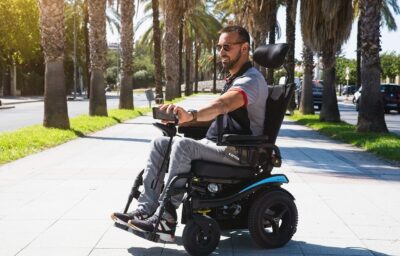
Reduced mobility: what help is available on flights and at airports?
For many of us, travel is an enriching, enjoyable experience. It’s a way to learn about different cultures, experience other ways of life and broaden our understanding. When we begin to experience problems with mobility, or other complications from disability it’s easy to imagine that the joy of travel is no longer available. At Total Travel Protection we’re dedicated to making sure travel is still possible by offering top-quality travel insurance for people over 65 and people with pre-existing medical conditions, as well as helping to make travel as simple as possible.
One of the biggest concerns for people with reduced mobility or other disabilities is how they will fare at the airport and during their flight. This article gives you a simple round-up of what help is available, how to get it and how the law protects your right to travel safely and comfortably with a disability.

What help can I get at the airport?
The good news is that there are measures in place to make sure that you can get around the airport safely and efficiently. The umbrella term for this help is Special Assistance and it’s available worldwide. This help can include:
- Transfer to the terminal building from your vehicle or designated drop-off point
- Use of an airport wheelchair
- Help getting through security
- Priority boarding
- Help getting to the plane
- Help getting on board – even if you can’t use the steps to the plane
Will I get help at my destination too?
Yes – the legislation around special assistance is international, so all airports must provide some level of help. That said, there will be variations – if an airport is very large and busy, or very small with fewer staff you may need to wait a little while. You should never be put in any discomfort or placed at risk though. When you arrive at your destination you can expect:
- Help to leave the aircraft -even if you cannot use the steps
- Help to go through immigration
- Help to collect your luggage
- Help to connect with your onward journey
What kind of help can I get onboard the plane
There are also guidelines to ensure you can travel safely and comfortably once onboard. This includes things like:
Selected seats – these are often towards the front of the plane
Help getting to and from the toilet – but you must be able to use the toilet on your own or have someone with you to help
- Provision for carrying oxygen
- Provision for medicines
- Provision for dietary needs
How do I get Special Assistance?
To get special assistance you must contact your airline or tour operator at least 48 hours before you travel. They will liaise with the airports and arrange for their specialised ground crew to help you as needed.
Everyone has different needs, and you’ll find your airline or travel operator will ask specific questions about the level of help you require. They’ll ask about whether you need to bring your own wheelchair, whether you need medication or to carry oxygen and what level of support you need once onboard your flight.
Whilst the airline has a responsibility for assisting you, it’s important to ask questions about anything that will affect your travel. You may wish to ask
- Are wheelchairs available on board all aircraft?
- Do the aircraft use bridge or step access?
- Are there any restrictions about battery carriage?
- Will the airline carry oxygen?
- What to do with medication at security
- What to do about booking your seat in advance
Both the airline and airport are there to help you travel safely and comfortably. If there’s anything you’re not sure of, just contact your airline and they will offer comprehensive support.
What is the law about Special Assistance
Legislation around Special Assistance was drawn up to remove barriers to travel. Naturally, Special Assistance is only effective if its available worldwide, and all commercial airlines and airports are obliged to offer support for passengers with disabilities. There are of course grey areas, and steps are continually being taken by the IATA to support those passengers with hidden disabilities as well as visible mobility issues.
Various Equality Acts are in place to ensure that people with disabilities are not discriminated against and can travel in safety, comfort and dignity. An airline is not allowed to refuse travel to a passenger with a disability unless they have clear safety concerns. These must be submitted in writing.
Do I need to mention my disability when I book my trip?
As a traveller, you are obliged to make your request for Special Assistance at least 48 hours before you travel. You do not necessarily have to mention your disability when you book your trip, but it may be useful for your travel operator, accommodation provider or guide to know in advance. This will mean they can put things in place to make your trip as smooth as possible. Advance notice means things like ground floor accommodation, specially designed accessible rooms can be made available.
Telling your guide or tour organiser about your disability means they will be prepared for any extra breaks you may need to take or any particular things they can do to make your trip more enjoyable.
What can I do if things go wrong?
Unfortunately, things can go wrong when travelling. If an airport is very busy, or very short staffed then you may find you have to wait a while for your Special Assistance. This can be distressing. It’s important to try to remain calm. If you’re travelling with someone, make sure they understand how the system works so they can support you and help if necessary.
If you are very unhappy with the service you received, then you can apply for compensation through your airline. Serious issues with Special Assistance, such as missing a connection, are unusual but it’s good to know there is legislation in place to support you should the worst happen. Combine this with the peace of mind you get from having medical travel insurance from Total Travel means the world is still open for you to enjoy.
Where to find the latest information
Article tagged with:
